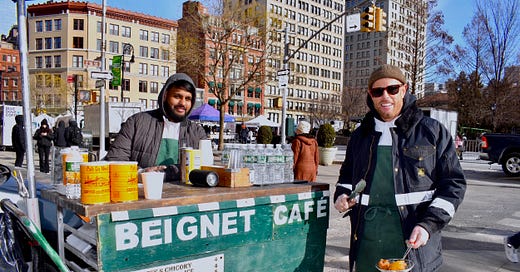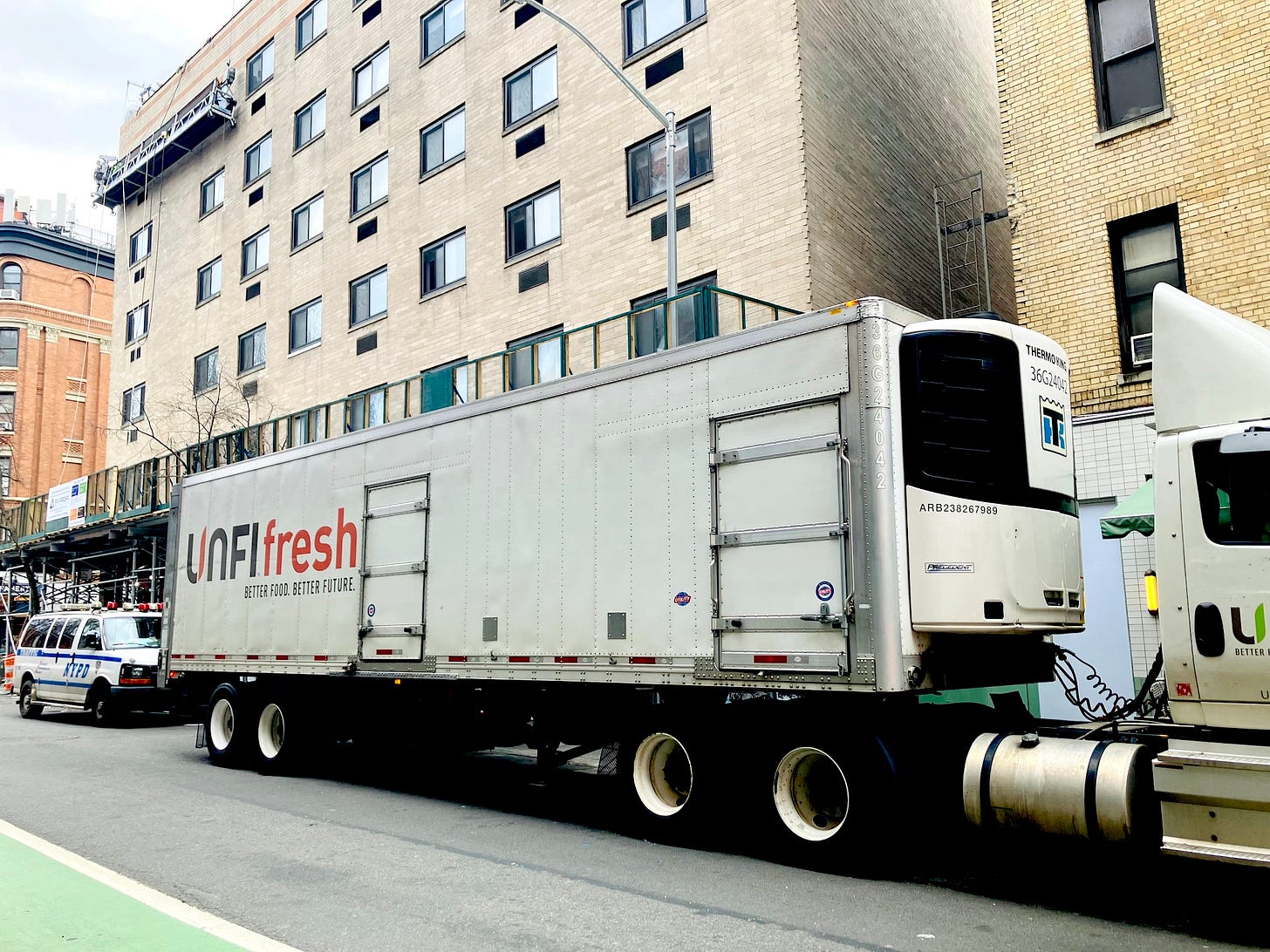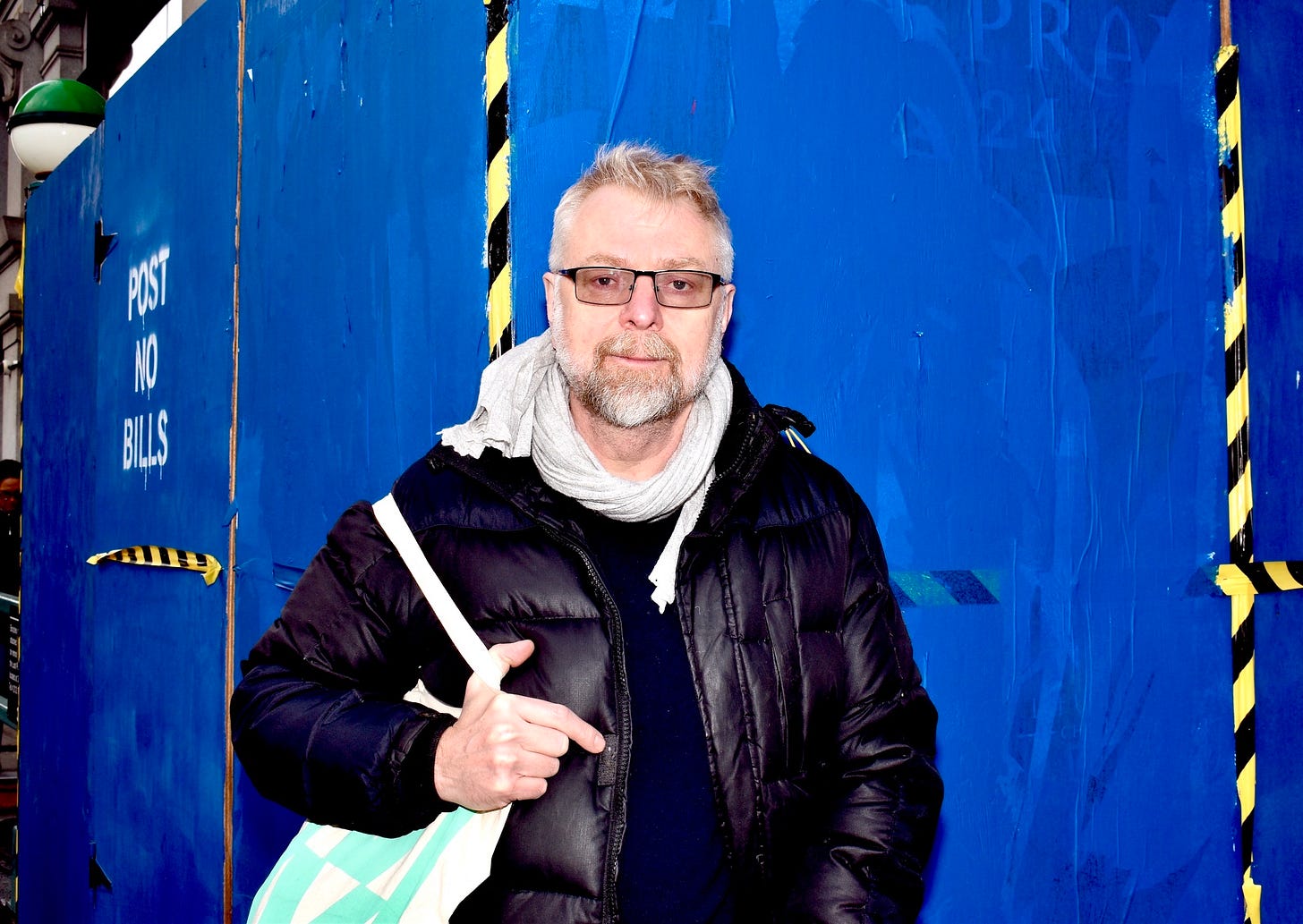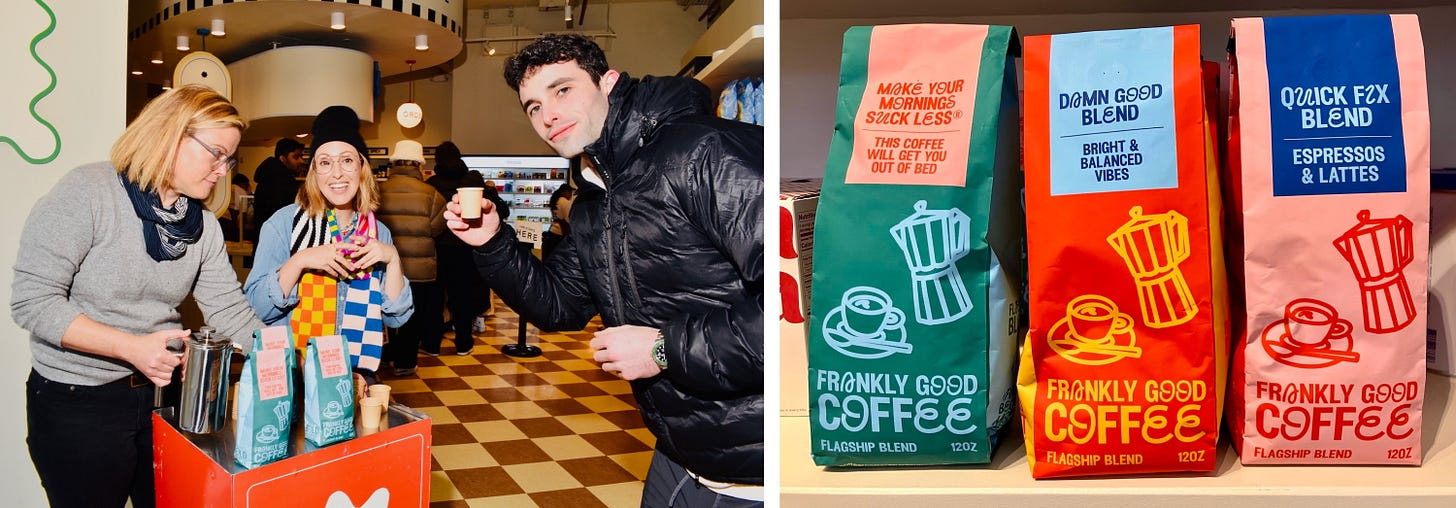NYC's Mercantile Mayhem: Beignets at Union Square, Broadway's Almost Back, Congestion Pricing Con't, DJ Darek Mazzone, Air Roasted Coffee and How to Help Los Angeles
A newsletter about the survival of independent businesses in New York City with a focus on immigrant-owned, storefront retail and CPG enterprises.
BEIGNETS ON 16TH STREET
Who doesn’t love fried dough? Especially beignets when they are fried in cottonseed oil and topped with powdered sugar right here in New York City. But first, before I get into my beignet adventure, I need to give a shout out to photographer Paul Vlachos who alerted me to the fried dough duo, thank you, Paul! (See his beignet cart photo and others his website.)
The Beignet Cafe cart is situated on the edges of the Union Square Greenmarket on 16th Street and Union Square West. It’s been selling the New Orleans staple treat along with Cafe Du Monde coffee that blends chicory, in its current location since March 2024. Prior, it operated in McCarren Park in Williamsburg, Brooklyn.

Dave Leach, the founder, is not a New Orleans native, but lived there for a year and learned the art of beignet making and he continues to visit once a year.
During my visit with the beignet duo there was a steady stream of customers, including many teenagers from the nearby Clinton School. Two students, amid a little powdered sugar flying through the air, even called the fresh beignets “heartwarming”. Southern hospitality prevailed, Leach and Jason Simeon, his co-worker were friendly to passersby, many “Good afternoon, ladies” and “Bon Appetites” were heard. Leach says talking with customers on the street, making genuine human connections, coupled with making the best product possible, is what makes him happy as a business owner.
BROADWAY’S BACK, SAVE FOR REGIONAL VISITORS
Broadway theater attendance is nearly back to pre-pandemic levels. New York City residents, national and international tourists are buying tickets, but one group is lagging, residents living just outside New York City. Ticket sales for New Jersey, Westchester and other suburban residents are still down 15 to 20% compared to 2019. The Center for an Urban Future created a panel discussion at New World Stages last week to address why Broadway theater attendance among regional suburbanites remains significantly lower than pre-pandemic levels.
The Center for an Urban Future’s Eli Dvorkin moderated the panel, which included Tom Harris, the president of Times Square Alliance, Jee Mee Kim-Diaz, the city executive of Arcadis, the founder and president of the Situation Group Damian Bazadona, Charles Flateman, the executive VP of The Shubert Org. and board chair of NYC Tourism and Conventions and NYC Council member Erik Bottcher.
Panelists cited multiple issues why suburbanites are staying away: horrible travel experiences into the city, most notably NJ Transit, fear of crime, the astronomical expense of Manhattan in general and new entertainment habits that formed during the pandemic.

Crime being a tourist deterrent is a serious issue, which is likely why the second half of the event was an interview with Manhattan District Attorney Alvin Bragg. Most everyone agreed that even if some types of crimes are down (others have risen) the fears need to be addressed.
Some panelists said that the chaos of Times Square—vendors, Elmos, pedicabs—contributed to turning off these visitors. I personally love the chaos, it makes Times Square, Times Square. I mean, does anyone remember the Times Square of the 1980s? Today’s Times Square is child’s play by comparison.
One issue that came up was how to attract interesting, unique retail stores to the area, when developer landlords are charging insanely high rents. (Chain stores are typically the only businesses that can afford the expensive rents.) This question is relevant to many other parts of the city too. If you have ideas, please contact Tom Harris.
You can listen to the event here (requires signing in). I suggest you join the Center for an Urban Future’s mailing list, they publish reports and organize events about specific economic segments of New York City.
CONGESTION PRICING, RESTAURANTS AND RISING COSTS
It’s too early to tell if congestion pricing will be a disaster for truck reliant small businesses. But I think it’s safe to say that every truck charged $21.95, $14.40 or the off peak $5.40, per entry, costs will rise for small businesses and customers will see prices also rise. Julia Moskin wrote a good article specifically about the restaurant business for the New York Times, click here for her gift article. And if you are confused about truck delivery rates, this article in Land Line by Tyson Fisher is one of the clearest I’ve read.
Then there is the additional issue of small business and foot traffic. I’m working on a longer story, I’m comparing some independent businesses’ January 2024 numbers to January 2025 numbers. (If you have any data you’d like to possibly add, please contact me: ninarobertsnyc@gmail.com.)
Most city officials who support congestion pricing have the same comment regarding truck fees: companies that deliver can make more deliveries per day because the streets are less clogged. Ok, maybe… we shall see.
The MTA Chair Janno Lieber was recently interviewed on WNYC’s Brian Lehrer Show. Lieber addressed trucking (at minute 13) and said the off-peak entry fee $5.40 should encourage night deliveries. I think this is odd because many cafes, stores and restaurants do not have staff to receive deliveries at night. Lehrer brought up the issue of noise from night deliveries, as idling and unloading trucks are typically loud. Lieber responded by saying, “Most of those deliveries are made to commercial districts… “ Excuse me, what? Has Lieber ever noticed how many apartment buildings have restaurants, stores and other truck-reliant businesses on the ground floor? Is Lieber intentionally gaslighting or high on his own PR spin supply?
ASK A VISITOR: DAREK MAZZONE OF SEATTLE
This is the third installment of Mercantile Mayhem’s Ask a Visitor featuring Darek Mazzone. He’s the long running KEXP DJ for the modern global music show Wo’ Pop, a music programer for Town Hall Seattle and co-founder of the nonprofit SAMA. Originally from Poland, Mazzone immigrated to Boston, MA, as a kid and eventually moved to Seattle where he’s lived most of his adult life.
Mazzone travels the globe for work and has been making regular trips to New York City since the late 1980s. He recently attended the music presenters conference APAP and GlobalFest in New York City, I asked Mazzone about what he’s observed this visit and aspects of the industry.
Nina Roberts: Today is the 6th day of congestion pricing, how does the subway seem to you?
Darek Mazzone: I don't think I see more security on the subway now than before. It's quieter. I see less migrants selling candies than I have before, but I don't know if it's the weather, or something else going on.
NR: How do the city streets seem to you?
DM: Well, it seems that people are in a state of reflection. The last time I was here, there was a lot of vitriol and anger at the right or left. It feels a bit more calm, a little more sedate maybe.
NR: Are people at your conferences talking about post-pandemic performance attendances?
DM: Yes, it's an opportunity to talk about this fundamental question, can we train people to go out again? Here in New York, people went out during much harsher times, but the reality of what you could do at home was much less compelling, you had three channels, Dallas, Dynasty, Benson…
NR: So, the attendance levels are not back up?
DM: No, still struggling. A lot of nonprofits know how to raise money to do something, but they don't know how to actually bring in an audience, two different skill sets. It requires people to be induced to actually come out more.
And the big complaint right now from venue owners is that this generation is not buying alcohol. That's how venues make money, so they have to figure out how to create more opportunities for people to spend cash.
The sadness within the industry that I'm dealing with right now, some of my colleagues get so wrapped up in a minutiae that they don't see the forest through the trees. They're trying to work through all the politics—what kind of show am I doing? Is it the right show? Am I the right person to be putting this on? It's watching somebody who can never be pure enough, can never do enough. I'm like, just do something, have fun, nobody really cares.
Where is the shared humanity in experiencing this art? It’s like you elevate a group and then you dehumanize that group because they no longer… you don't consider them to be just like you. When I say this, a lot of places look at me like I’m some kind of heretic.
NR: I can imagine!
DM: I just had a sold out show with an amazing Iranian artist and I know that there were people who voted for Trump in the audience because they trust me and they're moved by the music. Music and art can bring people together.
This Q&A had been edited and condensed for clarity.
AIR ROASTED COFFEE AT POP UP GROCER
The new rotation of Pop Up Grocer’s goods hit the shelves this past Saturday, I was curious about Frankly Good Coffee and not just because of the striking packaging. It’s the only coffee I’ve tasted that is air roasted rather than drum roasted, as far as I know. Kelly Bennett, the brand strategist who helped bring Frankly Good Coffee to Pop Up Grocer’s shelves (and paid subscriber, thank you!) was on site giving out samples. She likens air roasting to an air popcorn popper.
The coffee, I tried the “Make Your Mornings Suck Less” that was delicious, with no bitterness. Nearly all the shoppers who sampled the coffee had the same reaction. Could air roasting ever go mainstream and replace drum roasting? Or is coffee missing a certain something if it doesn’t have a touch of roast you can only get from the traditional method?
HELPING ANGELENOS DIRECTLY IMPACTED BY THE WILDFIRES
It is absolutely heartbreaking to see wild fires destroy neighborhoods in Los Angeles. Many nonprofits and brands are reviving programs launched during the early days of Covid to help Los Angeles’s fire victims and first responders, even here in New York City.
NYC’s Welcome to Chinatown sprang into action and brought back its Sik Faan Fund. All donations help will go towards purchasing meals for first responders and evacuees in Los Angeles. Sua Superette and Rosalyn Supper Club are two of the participating small businesses in LA thus far, more could be added. To donate click here, more information is on this Instagram post.
The bookstore Archestratus in Greenpoint, Brooklyn is having a “To Live and Rebuilt in LA” bake sale on January 25. You can bake and/or purchase treats to eat; money raised will go to a nonprofit of Archestratus’s choosing. This is not an amateur hour bake sale! It’s very organized and many bakers have already signed up. The spreadsheet is here if you want to bake, it includes details about drop off day/time. The bake sale starts at 10am, details here, I would advise getting there earlier rather than later.
You can donate directly to World Central Kitchen/Chef José Andrés.
Daniel Lubetzky, founder of Kind Snacks, co-founder of Somos Foods and of Shark Tank fame, also founded the nonprofit Frontline. The organization collects donations of all types, including CPG (consumer packaged goods) products, to help frontline workers. To donate, click here.
Los Angeles-based Odd Bird Co. (which sells beautiful clothing made in Turkey, owner Ceren Alkaç-Lee’s homeland) is creating a $5 raffle this week for Altadena families who have lost everything. Any brands that want to contribute to the prize packs Odd Bird Co. is creating, contact Odd Bird via Instagram, more information and Instagram link here.
The Locavore Variety Store here in NYC has created a list of shops in Los Angeles that were impacted by the fires and need help. Some shops are completely gone. Take a look at the link here.
There are many independent CPG brands in NYC, LA and elsewhere in the US donating purchase proceeds to nonprofits and/or products to people/businesses/restaurants in need. Many of these CPG businesses have posted on Instagram and can be easily contacted via DM. A few brands I’ve come across: Graza, Monte’s and Ciao Pappy. If there are more CPG brands donating products and/or funds, please let me know and I’ll add them to the next newsletter.
CALLING ALL INDEPENDENT SHOP OWNERS, YOUR EXPERIENCE AND OPINIONS ARE NEEDED!
Continuing with the The Locavore Variety Store, owner Caroline Weaver is writing a book (in addition to The Locavore Guide to Shopping NYC she recently wrote) about brick-and-mortar businesses across the US. She’d love to hear about the experiences of retail business owners so she created a survey geared for shop owners. It shouldn’t take more than ten minutes to complete. Listen to Weaver explain why she created the survey here and here; fill out the survey at theshopsurvey.com.
Thank you to Mercantile Mayhem’s sponsor Accompany Capital. Based in New York City, Accompany Capital, a CDFI, helps immigrants and refugees with loans and financial services. Please read about it here.
Thank you to Small Business Majority, Mercantile Mayhem’s sponsor. SBM supports and empowers small businesses across the US with a focus on public policy. Please read about SBM here.
MERCANTILE MAYHEM NEWSLETTER SPONSORSHIP
I am still looking for one additional sponsor—individuals, businesses, organizations or foundations—who believe independent businesses in New York City need to survive. If you would like to know sponsorship rates and newsletter stats (open rates and such) please email me: ninarobertsnyc@gmail.com and I’ll send you the details. Please forward this newsletter to others.
OPPORTUNITIES
The finance platform Skip is offering a grant for $10,000, open to all business owners in the US. More information here. The application is due on January 15, 2025.
The Retail Readiness Entrepreneurship Training Program is a 16-week virtual training program for actual or would-be retail entrepreneurs in cities with wealth disparities selling agricultural-based goods. A $1,000 stipend is offered. It’s funded by Walmart, more information here, application is due January 26, 2025.
Santander’s Cultivate Small Business Grant is a free, 12-week curriculum coupled with a capital grant ranging from $2,500 to $13,000. It’s geared for early food businesses owned by women, BIPOC or immigrants who live in New York City, greater Boston and Rhode Island. Apply here by January 30, 2025. Santander is having an information session on January 22, 2025, sign up here.
Small businesses in New York City could win a micro grant up to $5,000 through CitizensNYC. Grant deadline is February 7, 2025. The NYC Small Business Services will hold a free webinar on January 21, 2025, noon to 1pm with José Dobles of Citizens Committee for NYC and Carlos A. Santiago of CitizensNYC. The webinar with cover qualifications and how to apply for the CitizensNYC grant, webinar information here.
Immigrant founders, find your people and network through the Unshackled Ventures community. Unshackled Ventures is VC fund based out of the Bay Area cofounded by Manan Mehta and Nitin Pachisia, apply here.










I wish the beignet cart was still there! Luckily I caught them several times.
Lots of good information as usual!